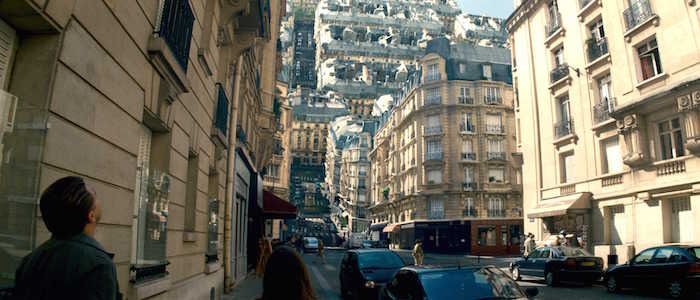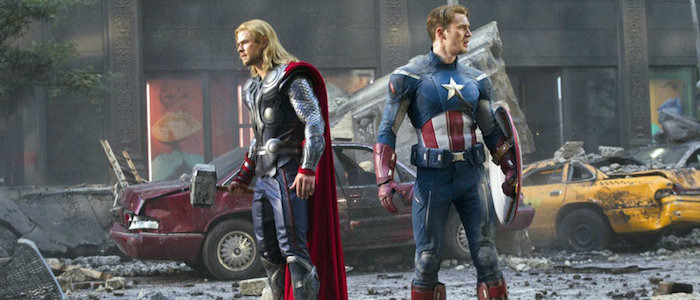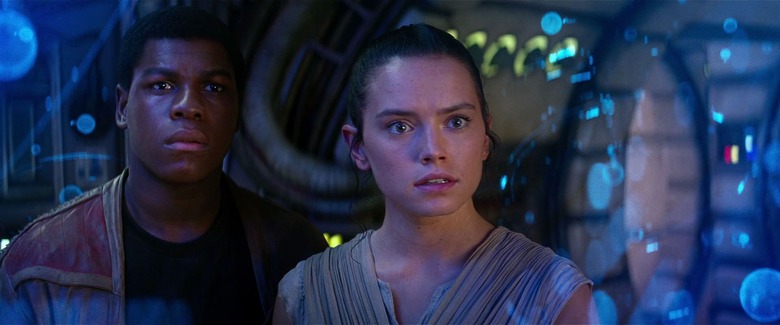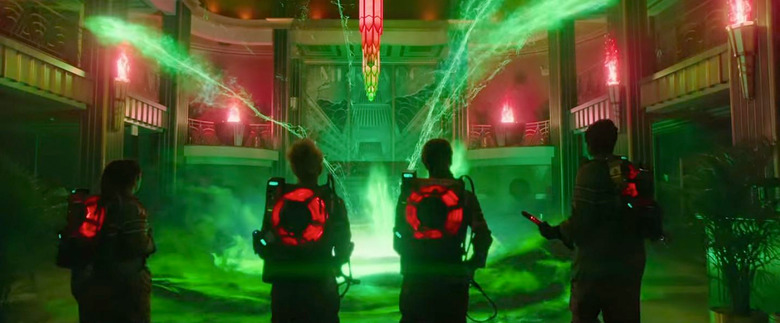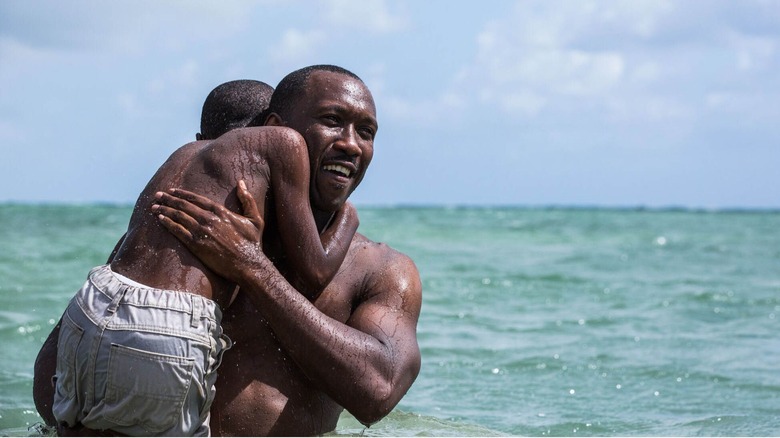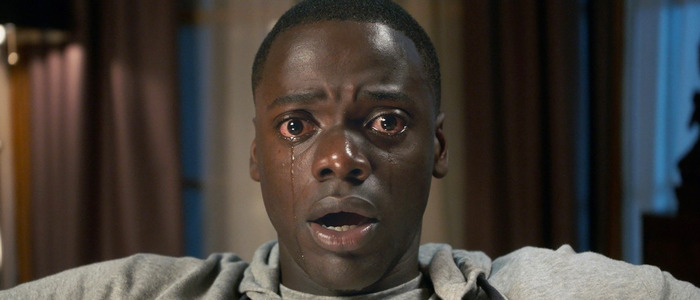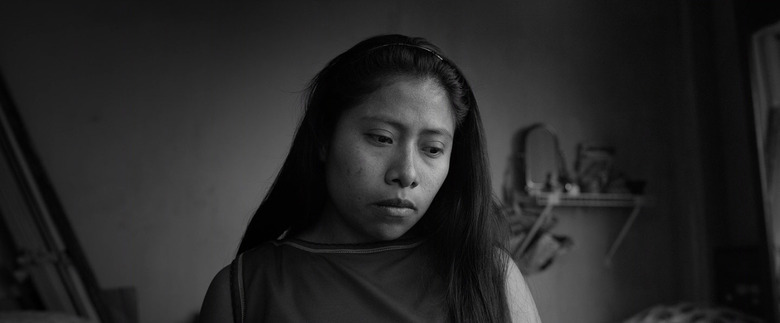The 10 Movies That Defined The Decade, For Better And Worse
(This article is part of our Best of the Decade series.)Everybody's got their opinion on the best films of the decade. There are consensus favourites and weird idiosyncrasies on everyone's list. But what films actually defined the decade? Which films were representative of the changing culture across those ten years? Which films best represent the trends in cinema? It's been a decade of enormous change, both in the film world and the wider one, and though we can't sum up all of it in ten films, we can certainly try.
Inception (2010)
Few films as willfully complex and intellectual as Inception manage to penetrate pop culture to the degree this one did. Riding a wave of cred after The Dark Knight, Christopher Nolan convinced droves of people to attend a film about multiple layers of unreality, dream logic, and grief – and it stuck. Memes like "we need to go deeper" continue to circulate nearly a decade later, and any film based around a heady science fiction concept is inevitably compared to Nolan's film. Its trailer also had immense impact, with its influences still felt today. The (misattributed) "Hans Zimmer Bwaahm" is a sound everyone associates with Big, Weighty Reveals. Perhaps most incredibly, the film ensured that the word "inception" – not a word one uses frequently in day-to-day life! – would be part of the cultural lexicon for years to come.Runner-Up: Three Billboards Outside Ebbing, Missouri, whose entire premise functions, unintentionally, as a setup for one of the best movie memes of the decade.
Bridesmaids (2011)
Paul Feig had directed films and a whole bunch of television before, but he will forever be known as "The Director Of Bridesmaids." In addition to launching Feig to become the most successful comedy director since Judd Apatow, the film's success likely greenlit a great many female-led comedies and quite a few female comedians' careers. Melissa McCarthy, notably, has a hugely successful career – and an Oscar nomination – to thank Bridesmaids for, and it certainly didn't hurt other then-rising stars like Ellie Kemper (The Unbreakable Kimmy Schmidt) or Rebel Wilson (Jojo Rabbit). Though a number of subsequent lady-led films were marketed somewhat cynically, the wave that followed Bridesmaids contained many genuine hits, like Trainwreck, Girls Trip, Blockers, Pitch Perfect, Spy, and Bad Moms. Bridesmaids' knock-on effects are also largely to thank for a greater female presence in four-quadrant blockbusters, too. Plus: it contains the best extended poop joke of the decade. Runner-up: Mad Max: Fury Road, which through the character of Imperator Furiosa arguably did the same thing for female-led action films.
The Avengers (2012)
Marvel's grand experiment worked. In 2012, Disney's superheroic subsidiary launched the biggest superhero film of all time, teaming up four films' worth of heroes into The Avengers. The film, and the cinematic universe concept, inspired many imitators, like the DC Extended Universe, the Fast and Furious series (which actually emerged somewhat alongside The Avengers), Disney-era Star Wars, and the ill-fated Dark Universe. Some were successful; others less so, but most attempts to photocopy Marvel's release strategy and jovial storytelling formula were blatantly transparent. No competitors could match the sheer marketplace domination of the Marvel Cinematic Universe – a franchise popular enough to sustain multiple releases a year. It's impossible to overstate the impact The Avengers had on film distribution. The cinema landscape is now even more totally dominated by huge blockbusters than it used to be, largely thanks to Marvel making its films appointment viewing. The series' unprecedented success arguably also gave Disney the purchasing power to buy Fox, acquiring additional content for its Disney+ service – that will itself further expand the Marvel franchise.Runner-up: Black Panther, a phenomenon in its own right and the first Marvel film to be nominated for the Best Picture Academy Award; and The Mummy, the film most emblematic of failed MCU imitators.
Life of Pi (2012)
Life of Pi might not be remembered as consistently as other films on this list, but it makes an appearance here representing three distinct trends that took place across the decade. Ang Lee's fantastical survival drama was the first English-language film other than the 3D re-release of Titanic to gross more in China than it did in North America – but it was far from the last. China is an increasingly important market for American studios, which has led to bigger, more extravagant visual effects blockbusters that transcend language barriers. Life of Pi was also the beginning of the end of the 3D box office boom that dominated the early years of the decade, using the technology well but to declining response. More invisible to audiences, but extraordinarily worrying for screen professionals, is what Life of Pi represents to the visual effects industry. VFX studio Rhythm & Hues, which provided most of the film's visual effects, filed for bankruptcy shortly before it won an Academy Award for it, at a ceremony protested by hundreds of effects artists. The scenario inspired a documentary, Life After Pi, and would later be repeated over and over across the industry. VFX studios are increasingly forced to underbid each other for contracts with unrealistic turnaround times, resulting in widespread burnout and often rushed work. Life of Pi isn't the only film to be affected, but it's definitely the most visible.Runner-up: The Fast and Furious franchise, which has become an enormous cash cow in China; and The Hobbit, which was rushed in every sense a film could be rushed.
Star Wars: The Force Awakens (2015)
Nostalgia drove many a film to the screen in the 2010s. Sequels to and reboots of properties ten, twenty, thirty, forty years old were everywhere, from Mad Max to Trainspotting to Rocky to 21 Jump Street. They met with varying levels of success creatively and financially, but none defined the decade quite so much as 2015's Star Wars: The Force Awakens. Delivering on an assumed promise that had existed for decades, it kicked off a third Star Wars trilogy – this time, a sequel to the original trilogy, with the original stars and everything. JJ Abrams' film is geared directly towards giving fans what they want, filled as it is with Millennium Falcon manoeuvres, X-Wing trench runs, lightsaber duels, and lonely deserts. Hell, the entire story is a thinly-veiled retread of the original Star Wars. That – and a decade or four of pent-up demand – goes a long way to why it became the highest-grossing movie ever at the domestic box office. It was smart, too, in introducing a vibrant new set of characters representative of a new generation, to whom Han, Luke, and Leia could pass the torch. In that sense, it was the perfect film for the purpose it served.Runner-up: Ready Player One, the absolute nadir of nostalgia movies, whose entire purpose is to fire neurons of familiarity
Ghostbusters: Answer The Call (2016)
The "female reboot" of Ghostbusters is surely the most down-the-middle film to inspire the biggest public uproar of the decade. The movie itself is fine – some love it, some don't, but it's lightly amusing, has likeable characters, and it sort of hangs together. It's a perfectly serviceable movie. But for every girl who was inspired by the film, there were seemingly a dozen Men Online determined to wipe it, and any film like it, out of existence. Ghostbusters was the first film to truly cause angry fans to mobilise their thinly-veiled bigotry and hatred. Lady ghost exterminators were apparently even more unthinkable than The Force Awakens' black stormtrooper, and they made a point of telling the cast and crew, over and over and over again, in the most vitriolic way possible. It became so widespread that the future Asshole-In-Chief of the United States decided to join in. The decentralised-yet-coordinated nature of the attacks was the biggest such movement since GamerGate two years earlier, and it tied in with both that event and the rise of Trumpist populism. Now, it's almost a given that asshole fans will attack anyone associated with a film they consider to be too "political," or to star women or people of colour. It's bad, folks, and it's sad that Ghostbusters was totally overshadowed by the furore surrounding it.Runner-up: The Social Network, which defined the public perception of Facebook's creator, but couldn't possibly predict the toxicity that would come to social media.
Moonlight (2016)
Queer culture truly had a renaissance in the 2010s. What had previously been hidden away finally got a chance to blossom in the public eye, largely driven by an increasingly accepting public that finally drove same-sex marriage to legality in many countries, including the United States. That acceptance was mirrored in pop culture, too. RuPaul's Drag Race rocketed to prominence, Queer Eye got rebooted, and LGBTQ characters showed up across the entertainment spectrum. Even James Bond was intimated, in Skyfall, to have had same-sex relations at some point. Moonlight, while not the biggest LGBTQ box-office earner, is nevertheless a milestone for a couple of reasons. Obviously, it's the first queer-centric film to win Best Picture at the Academy Awards. But it's also the rare queer indie film to gain any sort of mainstream recognition – and what's more, it's a story about being black and gay, which is an experience that rarely appears in entertainment. It's also a fucking terrific movie, absolutely packed with year's-best performances and confident filmmaking. Most deliciously entertaining of all was the exceptional, instantly iconic surprise Oscar mixup that ended with Moonlight winning its Best Picture award.Runners-up: Tangerine and A Fantastic Woman, which saw transgender actors and characters break through into a wider audience than before; and The Danish Girl, which sparked an outcry about the representation and casting of trans people onscreen.
Get Out (2017)
The 2010s were the decade that really saw the United States tear itself apart politically, more starkly than any point since the Civil Rights movement or maybe even the Civil War. The phenomenon was amplified thanks to social media and the 24-hour news cycle, as well as the rise of a racist strongman to the Presidency, but it really just exposed divides that had been around all along. Get Out is the film that best represents that divide. Its central idea – that white culture steals from black culture while stamping its people down – is depicted figuratively and literally in Jordan Peele's stunning debut. That this smallish-budgeted horror flick became a legitimate nationwide sensation, and won an Academy Award for its screenplay, is a testament to its quality but also to the incendiary environment into which it launched. Peele made precisely the right movie at precisely the right time, and ushered in both a renaissance of black horror and a greater respect for the genre as social commentary. Let us hope that America learns from it.Runner-up: BlackKklansman, which made explicit the link between the Ku Klux Klan of the past and the rebranded alt-right of today.
Roma (2018)
Netflix went from dipping its toe into the streaming waters at the start of the decade to becoming a legitimate movie studio at the end of it, and no film represents that journey better than Roma. The company had produced or purchased numerous exclusive movies for years by the time 2018 rolled around, but Roma was a distinct milestone. It represented Netflix making Art, commissioning a black-and-white, non-English passion project from a hugely respected director. It represented a shift from inexpensive, generic crowd-pleasers to big prestige productions. And most importantly, it won an Academy Award for its directing and its cinematography, as well as for best international feature, demonstrating that the movie industry had finally accepted Netflix as a legitimate moviemaking venture. Directors like Noah Baumbach, the Coen Brothers, Steven Soderbergh, Paul Greengrass, and Martin Scorsese have all added to the service's prestige lineup now. A Netflix account is almost a basic utility at this point. The sweeping change in how we watch movies has many worried about the future of cinematic exhibition, especially given Netflix's own token attempts at releasing its films theatrically, but there's no doubting it, and no fighting it. Streaming is here to stay.Runner-up: The Irishman, which could conceivably reach even greater heights at the 2020 Oscars.
The Lion King (2019)
Disney started a streaming service too, but it didn't do so before it spent half the decade plundering its back catalogue for high-budget, high-grossing live-action remakes. The Lion King, with its near shot-for-shot replication of the beloved 1994 original, was one of the most contentious of these remakes, largely centred on whether or not the all-CGI film was live action at all. Director Jon Favreau's decision to make his characters completely photorealistic robbed the film of much of its drama and its comedy, but it also speaks to a wider trend in animation, wherein realism is valued higher than artistry. It also smacks heavily of recent attempts to create a fully CGI human being, of which Rogue One's Tarkin is the most prominent example. But The Lion King is more useful as a lens through which to view Disney itself. The studio has spent the last decade acquiring, consolidating, and doubling down on profitable intellectual property, the ultimate expression of which was its acquisition of 21st Century Fox. The Lion King represents that behaviour in that it's the most recent Disney property to be remade – hell, the original film even has CGI in it – and it's the most successful, grossing a gargantuan $1.6 billion to date. Resting on IP laurels is paying off for Disney – and if the upcoming Disney+ slate is anything to go by, it's going to continue for a while yet. There is no stopping the machine that is the Walt Disney Company.Runner-up: Frozen, the only non-remake and non-sequel in Disney's TWENTY highest-grossing films. And it's still sort of an adaptation.

